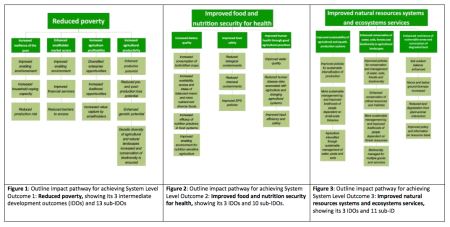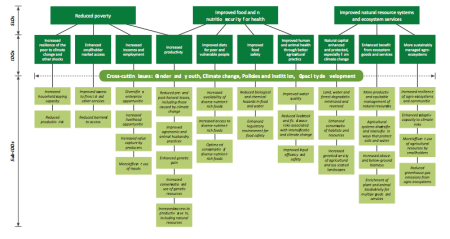There are “cross-cutting topics of global importance — women and youth; climate change; and capacity development — [that] will systematically strengthen and build coherence in research across all domains and Intermediate Development Outcomes (IDOs).” Should not conservation and sustainable use of agricultural biodiversity be one of these?
We posed that trenchant, though perhaps predictable, question last November, as CGIAR asked all and sundry for input on their new Strategy and Results Framework (SRF). Well, all and sundry have been heard, and the new version of the SRF is out. The answer to our question is, alas, no. The cross-cutting themes — now gender and youth, climate change, policies and institutions, and capacity development — still do not include agrobiodiversity.
But leaving it at that would be unfair. Remember that in the old SRF, as we pointed out last time, “use of genetic diversity … only contribute[s] to the reduced poverty outcome, and then only via increased agricultural productivity.” Here’s the chart to jog your memory, and sorry again for the poor quality. The sub-IDO in question is the one that breaks the symmetry of the left-hand column, click on the image to see it a bit better:
Here’s the new schema, thankfully now more legible:
Equally thankfully, conservation of genetic resources now contributes to the System Level Outcome of improved food and nutrition security for health, in addition to that of reduced poverty. See that little extra line going right and up from the IDO of increased productivity? That’s what a small victory, of sorts, looks like. And there are additional sub-IDOs that we can also get behind:
- Increased genetic diversity of agricultural and associated landscapes.
- Agricultural systems diversified and intensified in ways that protect soil and water.
- Optimized consumption of diverse nutrient-rich foods.
So I guess we can say that people saying things very much like those we say here have been heard, at least a little bit. Let the second round of consultations begin! The Consortium Board and then the Funders Council sign off on the SRF in March and April, respectively.


The tables and the rationale for CGIAR research are getting there and the sub-IDO “Increased conservation and use of genetic resources” is very welcome. But under the SLO “Improved natural resource systems and ecosystem services” there are three sub-IDOs that still follow the dogma that increased genetic-/bio-diversity is a mechanism for improvement in itself (for example, “Increased genetic diversity…”; “Agricultural systems diversified…”; “Enrichment of plant and animal biodiversity for ecosystem goods and services”).
This is wrong – it is not more but better biodiversity that is needed, in particular, species specialized by selection to do something no other species can do. If you want sand stabilization (and food for green turtles) then nothing beats Thalassia testudinum turtle grass in the Caribbean. There are endless examples of one monodominant species providing most of the ecosystem services in one area.
Philip Grime (FRS) is scornful of the diversity dogma: “Vapid, abstract theorising about supposed general benefits of high biodiversity may bring temporary consolations to those worried about food security, declining resources and dwindling populations but they are no substitute for systematic development and testing of ecological theories of wide ambit…”
The Science Council Commentary on the Sixth External Program and Management Review of Bioversity International (2009, p viii) said something similar: “Favouring high levels of biodiversity is ideologically appealing to many interest groups but the empirical evidence to support its supposed benefits is weak.”
If I draw this to the attention of the second round of review I shall get nowhere (but I’ll try).